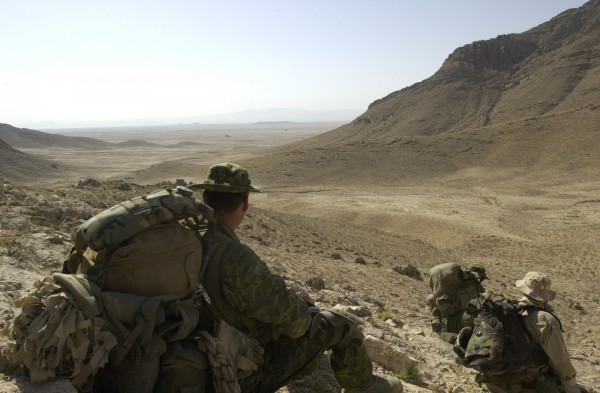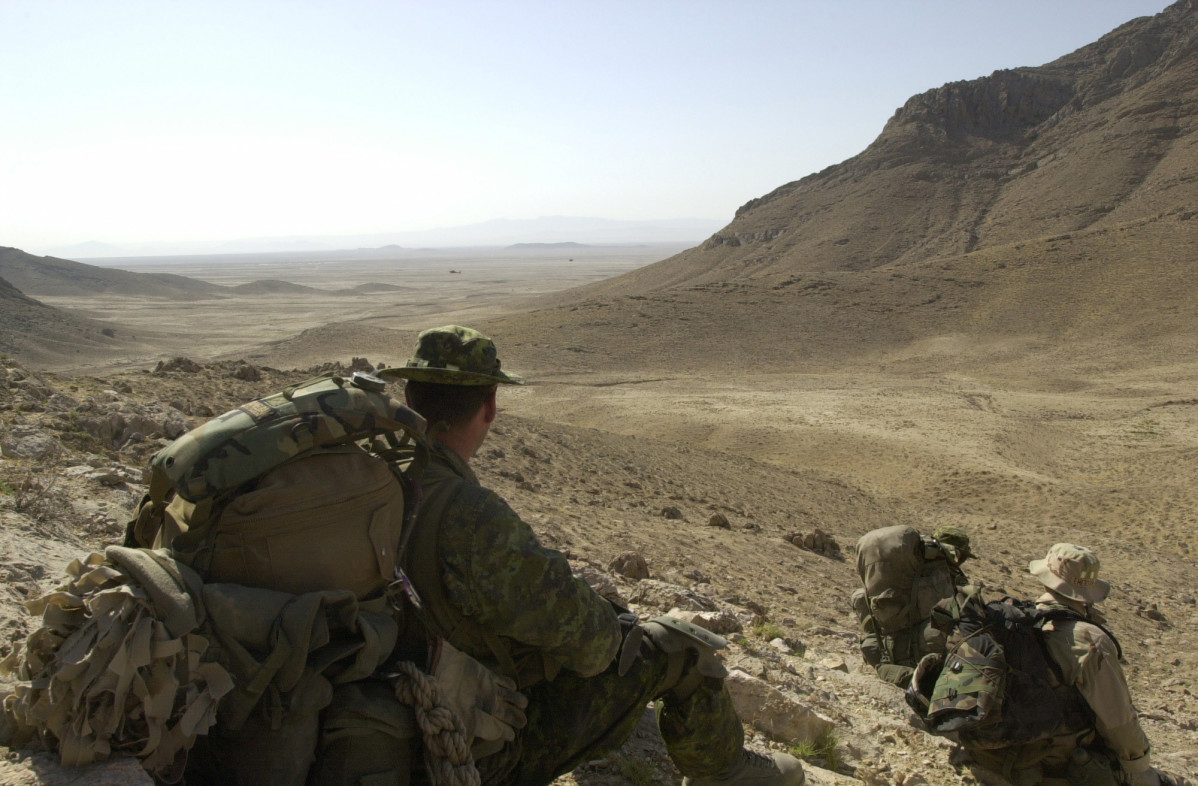
Canadian soldiers from 3PPCLI take a break as they move into the hills to search for Al Queda and Taliban fighters after an air assault onto an objective north of Qualat, Afghanistan on July 1, 2002. (U.S. Army photo by Staff Sgt. Robert Hyatt)
Robert Smol
In August, Justin Trudeau’s Liberals moved to solidify the unprecedented support they’d been getting from Canada’s veterans with the promise that a Liberal government would — in Trudeau’s words — “cover the cost of four years of post-secondary education for every veteran who wants one”, and that this education would be “fully-funded”.
Admittedly, this is nowhere near as important a gesture of faith in the future of Canada’s veterans as Trudeau’s promise to restore lifelong disability pensions (abolished in 2006), reopen closed Veterans Affairs offices and hire much-needed case workers. But together, these promises have made the Harper Conservatives’ performance on the veterans file look even weaker than before.
Once basic health and welfare is dealt with satisfactorily, there’s no better way to invest in the future of a demobilized veteran than a free post-secondary education. In fact, the success and security of many Canadian families was founded at least partly on a similar policy implemented after the Second World War.
But at the risk of looking a gift horse in the mouth, I have questions — lots of questions — about how this policy could be implemented. Trudeau has a shot at winning this election, so it seems like a good time to ask.
Veterans Affairs Canada defines a veteran as “any former member of the Canadian Armed Forces who underwent basic military training and is honourably discharged.” Frankly, it’s quite appropriate for the government to place no serious emphasis on experience or length of service. The fact that any trained member of the military is prepared to go to war — and would go to war if ordered — should be enough to earn the title of ‘veteran’.
But when it comes to compensation, whether it’s pay or pensions, experience counts. Appropriate or not, any future education benefit for veterans will be seen as compensation for service. Inevitably, in the interest of fairness, a future Trudeau government will have to rank — and quite possibly disqualify — certain categories of veterans.
Here’s the proof. Look beyond Trudeau’s promise and read the fine print in his party’s platform: unlike Trudeau’s announcement, the Liberal platform itself ever so prudently rewords the promise as “full support for the costs of up to four years of college, university, or technical education for Canadian Forces veterans after completion of service.”
So what is it with the “up to”? It appears that four years is not the promise — four years is the absolute maximum education benefit that a veteran could possibly qualify for under Trudeau’s program.
It only makes sense. Should a person who served honourably and diligently as a private for two or three years still receive a education benefit comparable to that of a sergeant with twenty years’ service and multiple overseas tours on his record? How could you justify giving a veteran a free education that lasts longer than the time he or she spent in service?
What about the thousands of part-time reserve soldiers, sailors and air personnel who might serve honourably and diligently while attending college or university? How long might they keep serving once they don’t have to in order to qualify for a free education?
And if this policy is implemented with a generous heart, the military will have to contend with the free education “grazers” — the ones who will, depending on their situation, try desperately to stay in uniform when they really should be doing something else with their lives. And while a generous education benefit might bring more hungry youths marching through the recruiting centre doors, is that really the motivation we want on the front line of the next conflict?
Finally, if a future Trudeau government does implement this policy, it will find itself under heavy pressure to make it retroactive. However they choose to dole out this benefit, there will be anger and resentment.
Maybe a future Trudeau government, much like Harper’s, will find it a lot safer to resort to pleasant platitudes of love and support for veterans instead of trying to placate such a heterogeneous — and fractious — demographic.
Robert Smol holds and Master of Arts in War Studies from the Royal Military College and served in the Canadian Armed Forces for over 20 years, retiring as an intelligence officer in 2004. He is currently an educator and writer in Toronto.
This article was originally published on iPolitics.ca and is reprinted here with permission through a a partnership with the Canadian University Press. The views, opinions and positions expressed by all iPolitics columnists and contributors are the author’s alone. They do not inherently or expressly reflect the views, opinions and/or positions of iPolitics or The Dialog.


